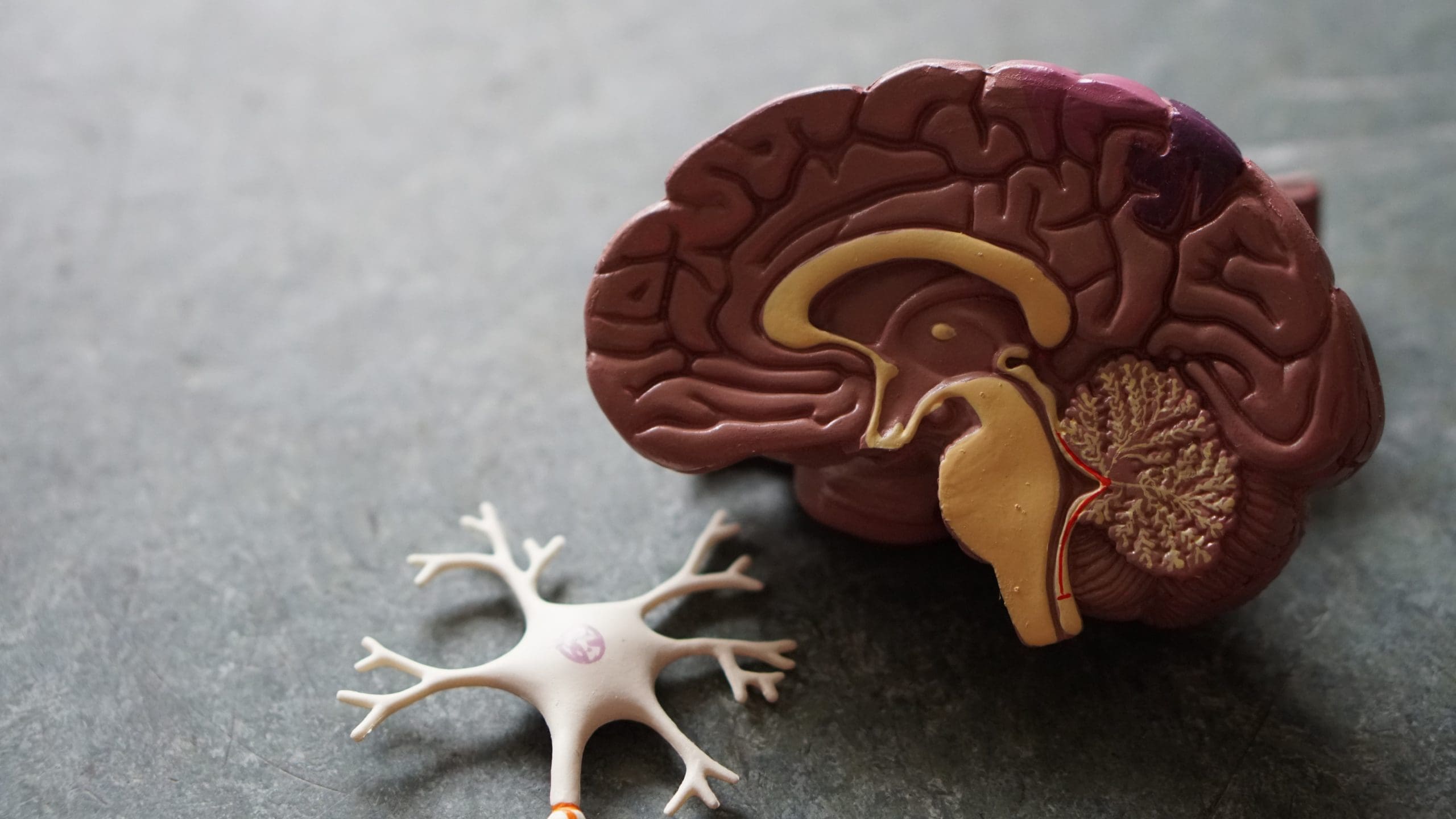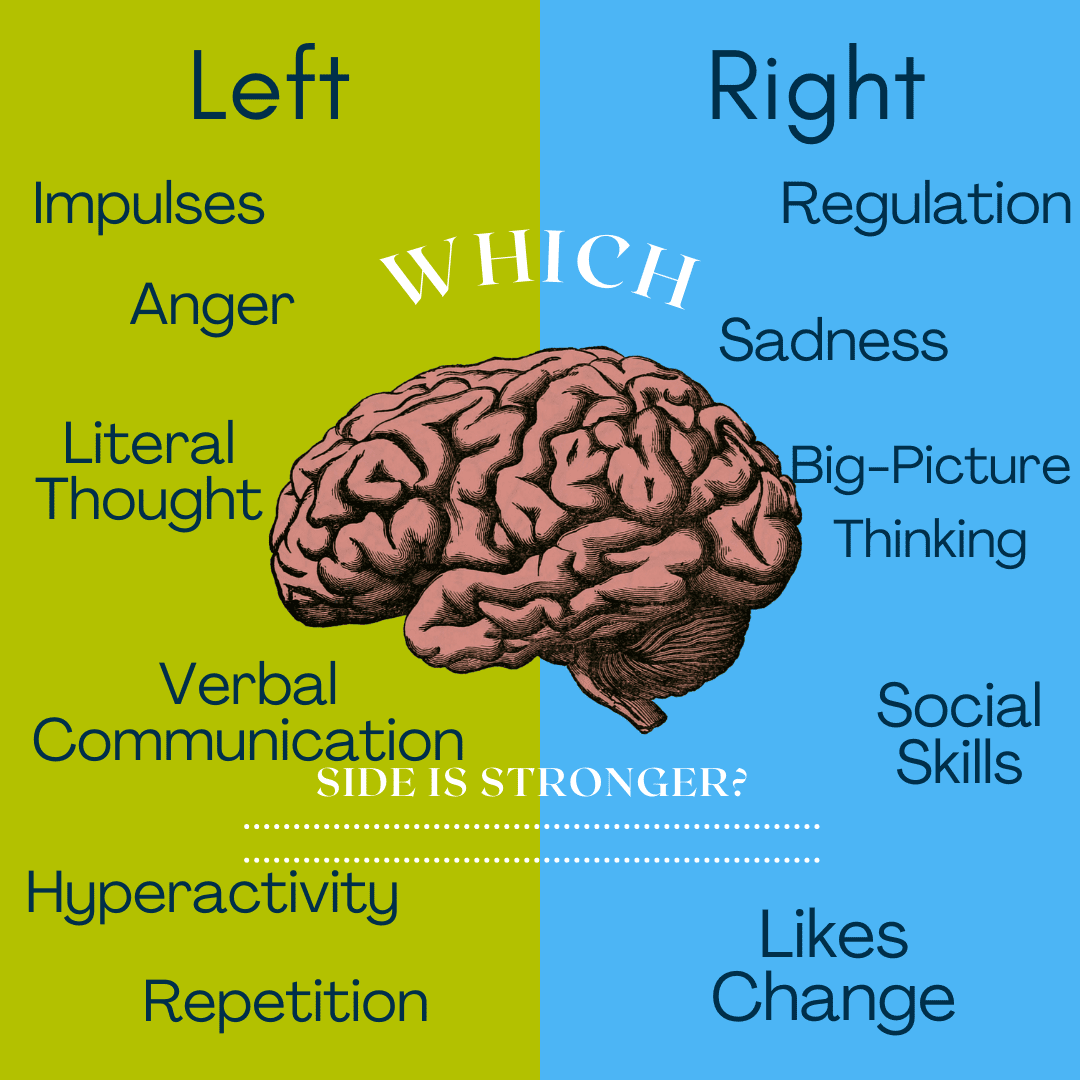Imagine that your child’s brain is like an orchestra, with a symphony of activity that leads to beautiful music. Unless one side is delayed or off-cue…
Picture that on their brain’s left side, let’s say we have the string section (violin, cello), woodwinds (clarinet, saxophone), and brass (trumpets, tubas). On the right side of the brain are the pianist and other strings like guitars and harps. Towards the back and on the right side imagine the percussionists (drums).
Stay with me here, I promise this is going somewhere!

At the very front of the orchestra stands the conductor. Each instrument in each section has to be playing at the exact same time and at the exact same speed, while the conductor provides guidance and timing.
If you’ve ever heard orchestra music, it’s easy to understand that one or two instruments missing a note or striking the wrong note doesn’t matter much. But what if everyone on the right is playing just a bit too fast and everyone on the left is playing a bit too slow? The conductor is going to have a really hard time guiding everyone and that music is going to sound like metal grinding against metal – it’s not pretty..
That’s what it’s like when your child has one hemisphere functioning at a higher level than the other. The orchestra is playing but you can tell that there’s something really, really off.
Left Brain Vs Right Brain Imbalances
When your 10-year-old child has a hemispheric imbalance, one side of the brain is maybe functioning at a 10 or 11-year-old level but the other side may be functioning like a 6-year-old. (This is all hypothetical.) You can see where this could be a problem. Like a computer from the 60s trying to communicate with the iPhone 13.
You’ll probably notice this imbalance in their symptoms, too. A lot of people we work with say things like “He has the intelligence of kids multiple grades ahead of him, but prefers to hang out with kids that are a few years younger” Intellectually speaking they are light years ahead of their peers, but socially and emotionally, they are lagging far behind them.
Depending on what networks and which hemisphere is more out of sync, the effects on a kiddo’s life will vary from person to person.

Keep reading to learn more about what the right brain does vs what the left brain does!
It’s a myth! (Just kidding)
It’s definitely for real but some people (probably some of the articles you read before you got here) are misunderstanding the argument.
The scientists and doctors who use hemispheric responsibilities as a factor in their work understand that the hemispheres have different responsibilities but that one responsibility can’t stand without its supporting inter-hemispheric relationships.
Which really just means that even though specific networks do specific things, they can’t function properly without the other networks around them.
The “It’s a myth!” people, think we’re making the claim that one hemisphere could stand alone in its responsibilities, which is definitely not we’re saying.
They want to argue that everything has to be working together and networks all rely on other supporting networks to do their job – and we couldn’t agree more! But that doesn’t change the fact that improving the communication, coordination, and synchronization of each network in specific hemispheres will help your child in big ways.
In fact, the most latest and cutting-edge research tells us that objectively measuring and improving the weaker side of the brain is the MOST effective way to permanently improve brain function.
If you have questions, about your child’s brain development.
Contact Us Today!

All of it has to be working together for your child’s brain to be working correctly for him or her to have the harmony necessary to be the best version of themselves – the one that you know is in there.
What does the left brain do?
The left side of your child’s brain is responsible for all kinds of important things. It’s where the IQ comes from, fine motor skills are located here, and the left side of the brain really loves patterns, repetition, logic, and doesn’t like change very much.

It’s where emotions like happiness, anger, and frustration originate.
All of our impulses start in our left hemisphere. It’s always saying things like “Go here! Say this! Do that! Get angry! Consequences? What consequences? JUST DO IT!”

Verbal communication is primarily a left hemisphere function and our left brain is really good at picking out details and remembering stuff. It prefers subjects like math and science, which are much more objective, over subjects like literature and art.
What does the right brain do?
The right hemisphere is pretty much the exact opposite of the left.
The left hemisphere is for IQ and the right hemisphere is for EQ, or emotional intelligence.
The right brain loves for things to always be changing and is super social. Our ability to pick up facial expressions and body language originates here and it’s mostly responsible for nonverbal communication and big motor movements.

Withdrawal emotions like sadness and fear come from the right brain and it prefers emotional and big-picture stuff like art, literature, and anything that’s more intuitive or feelings-based.
Obviously, both sets of skills are necessary for a successful life.
Understanding the nonverbal communication that comes along with verbal communication is NECESSARY for making and keeping friends.
Understanding the big picture and main idea of a story we read is just as important as remembering some of the details, like the names of characters.
Math and science are important, and so is having a healthy social life.
He’s so smart, now if he could just [focus, control himself …]
Right brain weakness looks like…
* Emotional regulation issues, specifically with anger and frustration (think: meltdowns, tantrums)
* Clumsiness and coordination issues
* High impulsivity
* Struggling to make/keep friends
* Fidgeting
* Difficulty with time management
* Struggling to understand the main idea
* Defiant Behavior
Some of the common diagnoses that will come from a right hemisphere weakness are:
Attention Deficit Hyperactive Disorder (ADHD), Attention Deficit Disorder (ADD), Asperger’s, Autism Spectrum Disorder (ASD), Obsessive Compulsive Disorder (OCD), Oppositional Defiance Disorder (ODD), Anxiety, and emotional regulation issues.
Families with right-weak kiddos often hear things like “He’s so smart, if he could just [focus, control himself, etc.]”
Left brain weakness looks like…
* Processing difficulties
* Learning disorders
* Weak immune system
* Struggles with math
* Good at sports, good with friends, but bad grades
* Difficulty with verbal communication
The diagnoses common for left-weak kiddos are:
Dyslexia (difficulty with reading), Processing Disorders, Dyscalculia (difficulty with math), Dyspraxia (difficulty with speech), Dysgraphia (difficulty with writing), Learning Disorders (Difficulty with academic learning in general)

Some symptoms that you may see in your child?
Download THIS CHECKLIST
See which is stronger in your child – The right hemisphere or left hemisphere!
We wrote this to help you understand a little better, but we know it can feel confusing too. We’ve been working with families like yours for years and can tell you that we’ve only seen a handful of kids that perfectly fit into one category or another.
There are so many factors that can cause symptoms that LOOK like a left-brain delay show up in your right-brain delayed kiddo, and vice-versa.
For example, a retained Palmar/Grasp reflex can cause fine motor issues in your right brain weak child, even though fine motor struggles are generally a left-brain delayed issue.
And weak visual networks can cause lots of reading struggles and even a diagnosis of dyslexia in a right-weak child, even though true dyslexia is usually a left hemisphere weakness problem.
Your child might be doing really well socially or have no emotional dysregulation issues although their right hemisphere is still a little weaker.
Each brain and each child are different, which is why there is no list on the planet that can fully capture or give you answers about exactly what’s going on with your child’s brain.
Click the button below to schedule a free consultation any time with a director! We’ll chat with you about your individual child, help you clarify a right hemisphere or left hemisphere weakness, and show you what their plan/program to strengthen the weaker hemisphere might look like.
We’d love to hear from you in the comments! Do you think your child needs more work on their right hemisphere or on their left hemisphere?
Let us know what you think and what your questions are and we’ll get back to you ASAP!
